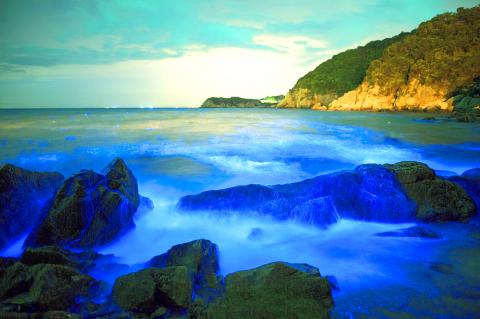Fluorescent sea sparkles, dubbed “blue tears,” that glow around the Matsu Islands of Lienchiang County are not caused by toxic algae and are not a sign of environmental deterioration, a National Taiwan Ocean University professor said on Sunday, challenging a recent study.
Chiang Kuo-ping (蔣國平) said that it cannot be established that the “blue tears” along Matsu’s beaches are associated with toxic algae because they do not drain oxygen from the surrounding waters and kill marine life in the process as stated in the study.
He said the single-celled Noctiluca scintillans, also known as dinoflagellates or sea sparkles, that generate the bioluminescence described as blue tears when disturbed, are non-toxic heterotrophs — organisms that cannot produce their own nutrients.

Photo courtesy of the Lienchiang County Government
In coastal ecosystems, they replace copepods — small crustaceans commonly found in aquatic communities — as the main consumers of phytoplankton and play the role of a “terminator” of single-cell algae called diatoms, which Chiang described as a normal phenomenon in marine ecosystems.
The toxic algae argument does not hold water along the coastlines of the Matsu Islands because the sea sparkles have not starved the water of oxygen or led to the death of marine life, he said.
The US study in the journal Geophysical Research Letters was conducted by people with expertise in studying satellite data and images rather by than ecological experts, he said.
The study by Hu Chuanmin, a professor of optical oceanography at the University of South Florida, was extensively covered by local media.
It argued that sea sparkles have become more abundant in recent years based on satellite images that have tracked their movement.
The study observed that from 2000 to 2003 when the Three Gorges Dam was being built on the Yangtze River and there was little water flow, there was only a small distribution of blue tears, but since construction had been completed and the water flow was restored to normal, the blue tears had steadily expanded.
While the reason for that cannot be determined for certain at present, it is likely related to the major release of pollution and agricultural runoff of nutrients from the Yangtze River into the East China Sea, the study said.
Explaining the study to the Live Science Web site, Hu said the sea sparkles are not toxic themselves, but when they eat, they usually choose toxic algae and in the process release ammonia and other chemicals that poison the water around them.
They also breathe oxygen until there is none left in the surrounding waters, making their growing numbers particularly troublesome, Hu was cited as saying by Live Science.
“The oxygen in the water is so low that many animals die,” he was quoted as saying.

Taiwan is to receive the first batch of Lockheed Martin F-16 Block 70 jets from the US late this month, a defense official said yesterday, after a year-long delay due to a logjam in US arms deliveries. Completing the NT$247.2 billion (US$7.69 billion) arms deal for 66 jets would make Taiwan the third nation in the world to receive factory-fresh advanced fighter jets of the same make and model, following Bahrain and Slovakia, the official said on condition of anonymity. F-16 Block 70/72 are newly manufactured F-16 jets built by Lockheed Martin to the standards of the F-16V upgrade package. Republic of China

Taiwan-Japan Travel Passes are available for use on public transit networks in the two countries, Taoyuan Metro Corp said yesterday, adding that discounts of up to 7 percent are available. Taoyuan Metro, the Taipei MRT and Japan’s Keisei Electric Railway teamed up to develop the pass. Taoyuan Metro operates the Taiwan Taoyuan International Airport MRT Line, while Keisei Electric Railway offers express services between Tokyo’s Narita Airport, and the Keisei Ueno and Nippori stations in the Japanese capital, as well as between Narita and Haneda airports. The basic package comprises one one-way ticket on the Taoyuan MRT Line and one Skyliner ticket on

Starlux Airlines, Taiwan’s newest international carrier, has announced it would apply to join the Oneworld global airline alliance before the end of next year. In an investor conference on Monday, Starlux Airlines chief executive officer Glenn Chai (翟健華) said joining the alliance would help it access Taiwan. Chai said that if accepted, Starlux would work with other airlines in the alliance on flight schedules, passenger transits and frequent flyer programs. The Oneworld alliance has 13 members, including American Airlines, British Airways, Cathay Pacific and Qantas, and serves more than 900 destinations in 170 territories. Joining Oneworld would also help boost

A new tropical storm formed late yesterday near Guam and is to approach closest to Taiwan on Thursday, the Central Weather Administration (CWA) said. Tropical Storm Pulasan became the 14th named storm of the year at 9:25pm yesterday, the agency said. As of 8am today, it was near Guam traveling northwest at 21kph, it said. The storm’s structure is relatively loose and conditions for strengthening are limited, WeatherRisk analyst Wu Sheng-yu (吳聖宇) said on Facebook. Its path is likely to be similar to Typhoon Bebinca, which passed north of Taiwan over Japan’s Ryukyu Islands and made landfall in Shanghai this morning, he said. However, it